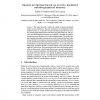Free Online Productivity Tools
i2Speak
i2Symbol
i2OCR
iTex2Img
iWeb2Print
iWeb2Shot
i2Type
iPdf2Split
iPdf2Merge
i2Bopomofo
i2Arabic
i2Style
i2Image
i2PDF
iLatex2Rtf
Sci2ools
100
click to vote
IWINAC
2005
Springer
2005
Springer
Spatial navigation based on novelty mediated autobiographical memory
This paper presents a method for spatial navigation performed mainly on past experiences. The past experiences are remembered in their temporal context, i.e. as episodes of events. The learned episodes form an active autobiography that determines the future navigation behaviour. The episodic and autobiographical memories are modelled to resemble the memory formation process that takes place in the rat hippocampus. The method implies naturally inferential reasoning in the robotic framework that may make it more flexible for navigation in unseen environments. The relation between novelty and life-long exploratory (latent) learning is shown to be important and therefore is incorporated into the learning process. As a result, active autobiography formation depends on latent learning while individual trials might be reward driven. The experimental results show that learning mediated by novelty provides a flexible and efficient way to encode spatial information in its contextual relatedness ...
| Added | 28 Jun 2010 |
| Updated | 28 Jun 2010 |
| Type | Conference |
| Year | 2005 |
| Where | IWINAC |
| Authors | Emilia I. Barakova, Tino Lourens |
Comments (0)

